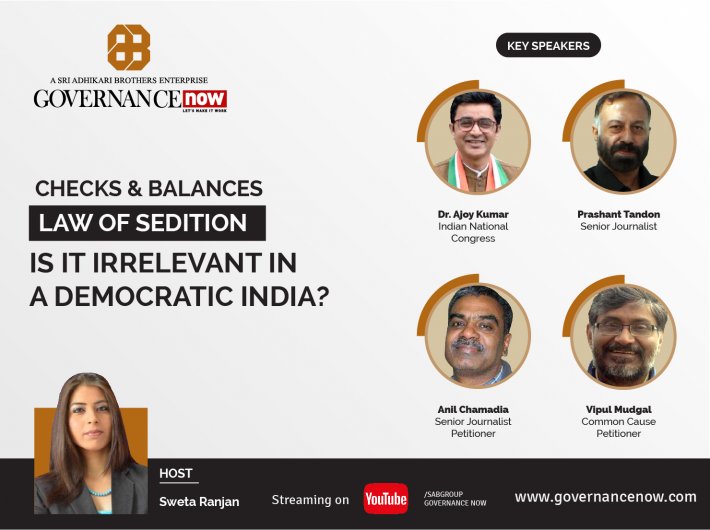The latest edition of CHECKS AND BALANCES, an online discussion with experts on governance hosted by Sweta Ranjan, discusses how (ir)relevant is the colonial-era law now, 75 years after Independence
Does the concept of sedition have a place in modern democracies? This question became more relevant when the apex court recently put the country's colonial-era sedition law on abeyance stating that there is a “requirement to balance… security interests and integrity of the State… and the civil liberties of citizens”. The top court put on hold trial in all sedition cases pending before courts across the country until the government completes its promised exercise “to re-examine and re-consider the provisions of section 124A of the Indian Penal Code".
The 152-year-old sedition law was first considered in Clause 113 of Thomas Babington Macaulay's Draft IPC in 1837 as S113 but it was not included in the final Act of 1860. It was added in 1870 after S124, as Section 124A. It was included by the British government as a tool to curb the voices of protest rising against the colonial administration.
Even Chief Justice of India N.V. Ramana criticised the law in July 2021, saying “Sedition is a colonial law. It suppresses freedoms. It was used against Mahatma Gandhi, Tilak… Is this law necessary after 75 years of Independence?”
That is the question the latest edition of ‘Checks and Balances’, an online discussion with experts on governance challenges hosted by Sweta Ranjan, takes up. How (ir)relevant is the law of sedition in Indian democracy?
Watch the latest episode here: https://www.youtube.com/watch?v=sbbjJBrJWvswww.youtube.com/watch
Journalist Anil Chamadia, editor of the monthly journals ‘Mass Media’ and ‘Jan Media’, who is also a petitioner against the sedition law, says, “The government wants to suppress the feeling of citizenship among the people. They want to run a feudal system and treat people not like citizens but like subjects. I advocate that the law of land should prevail, fair investigation should be allowed space and criminals or guilty should be punished. I am against the law of sedition and have been urging the court to strike down the law as it is being misused. Ninety percent of people charged against TADA and POTA belonged to the Scheduled Tribes. Even now, most cases registered under 124A are against those who have been vocal against the looting tendency of the government, be it an activist, artist, journalist or a political worker.”
Vipul Mudgal, a journalist who is also director and chief executive of the NGO, ‘Common Cause’, finds this law strange. He, like Chamadia, denounces the 1962 Kedar Nath Singh ruling that upheld the constitutionality of the sedition law. Mudgal says, “I find the existence of such laws is a discrepancy and absurdity. All political parties have continued with this law. All parties are to be blamed for continuing with such draconian laws. All parties have double standards. When out of power they criticize but when in power they misuse it to the fullest.”
Giving instances of its misuse, he adds, “Tamil folk singer Kovan was arrested for writing and singing a song criticising Jayalalithaa's government liquor policy. He was put behind bars under the sedition law. A case of alleged sedition was registered against 49 celebrities, including Anurag Kashyap, Ramchandra Guha, Aparna Sen, Mani Ratnam and Adoor Gopalakrishnan, who had expressed concern in an open letter to Prime Minister Narendra Modi over growing incidents of mob lynching.”
Senior journalist Prashant Tandon adds, “This has been misused by the governments against the public. This started within a few months of the formation of the Indian Constitution. This is a contradiction … The first amendment introduced in the USA provided people with the freedom of speech whereas India's first amendment in the Constitution imposed restrictions on the people. The first amendment gave birth to all draconian laws.”
Tandon adds, “In recent years, we have seen more than 100 percent jump in the number of sedition cases. This has been used against opposition politicians, students, journalists, authors, and academics. In the Balwant Singh vs State of Punjab case, 1995, the Supreme Court held that any slogan without evoking public response did not amount to sedition.”
Dr. Ajoy Kumar of the Indian National Congress says, “I agree that we made a mistake but it does not mean that others also should be allowed to do so... I personally feel that the Supreme Court’s decision to put the sedition law on hold is welcome. It sends a clear message to subjugators of dissent that the voice of truth will no longer be suppressed but there are many other existing laws like UAPA that may be misused to arrest anyone who is critical of the government.”
